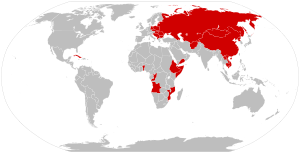Bach khoa toan th? m? Wikipedia
 B?n đ? nh?ng qu?c gia tuyen b?/t?ng tuyen b? la nha n??c c?ng s?n theo
ch? ngh?a Marx?Lenin
hay
t? t??ng Mao Tr?ch đong
(th?i gian tuyen b? co th? khac nhau)
B?n đ? nh?ng qu?c gia tuyen b?/t?ng tuyen b? la nha n??c c?ng s?n theo
ch? ngh?a Marx?Lenin
hay
t? t??ng Mao Tr?ch đong
(th?i gian tuyen b? co th? khac nhau)
Nha n??c c?ng s?n
(ti?ng Anh:
Communist state
hay
Marxist?Leninist
state
,
workers' state
) la
nha n??c
đ??c qu?n ly b?i
m?t đ?ng
, theo
Ch? ngh?a Marx?Lenin
, v?i h??ng ti?n len
ch? ngh?a c?ng s?n
.
[
c?n d?n ngu?n
]
Co m?t s? tr??ng h?p nha n??c c?ng s?n ho?t đ?ng k?t h?p v?i cac t? ch?c phi chinh tr? nh?
cong đoan
, ?y ban th??ng tr?c hay
dan ch? tr?c ti?p
.
[1]
[2]
[3]
[4]
[5]
Thu?t ng? "nha n??c c?ng s?n" đ??c cac s? gia, nha nghien c?u va truy?n thong ph??ng Tay s? d?ng. Tuy nhien, trai ng??c v?i ph??ng Tay, cac qu?c gia c?ng s?n nay khong s? d?ng thu?t ng? đo ma t? g?i minh la m?t
h? th?ng xa h?i ch? ngh?a
đang trong qua trinh xay d?ng
ch? ngh?a xa h?i
.
[6]
[7]
[8]
[9]
Nha n??c c?ng s?n thong th??ng ch? đ??c qu?n ly b?i
m?t đ?ng
v?i b? may chinh quy?n c?a no, cac đ?ng phai khac co th? cung t?n t?i trong nha n??c đo, nh?ng chung b? ki?m soat b?i đ?ng ch? ch?t. Cac đ?ng ch? ch?t ? đay th??ng la theo ch? ngh?a Mac - Lenin (ho?c đoi khi la
t? t??ng Mao Tr?ch đong
? Trung Qu?c), v?i m?c tieu la đi len
ch? ngh?a xa h?i
. Nha n??c c?ng s?n đ??c
ch? ngh?a Marx
coi la n?n
chuyen chinh vo s?n
c?a
giai c?p cong nhan
, n?i ma giai c?p nay lam ch?. đ?i ng??c l?i v?i đo la
ch? ngh?a t? b?n
, n?i
giai c?p t? s?n
n?m quy?n quy?t đ?nh.
- ^
Sloan, Pat (1937).
“Soviet democracy”
. Truy c?p ngay 11 thang 6 n?m 2023
.
- ^
Farber, Samuel (1992).
“Before Stalinism: The Rise and Fall of Soviet Democracy”
. Truy c?p 11 thang 6 n?m 2023
.
- ^
Getzler, Israel (2002).
“Kronstadt 1917-1921: The Fate of a Soviet Democracy”
. Cambridge University Press
. Truy c?p ngay 19 thang 7 n?m 2016
.
- ^
Webb, Sidney; Beatrice Webb (1935).
“Soviet communism: a new civilisation?”
. Truy c?p ngay 19 thang 7 n?m 2016
.
- ^
Busky, Donald F. (ngay 20 thang 7 n?m 2000).
Democratic Socialism: A Global Survey
. Praeger. tr. 9.
ISBN
978-0275968861
.
In a modern sense of the word, communism refers to the ideology of Marxism-Leninism.
- ^
Wilczynski, J. (2008).
The Economics of Socialism after World War Two: 1945-1990
. Aldine Transaction. tr. 21.
ISBN
978-0202362281
.
Contrary to Western usage, these countries describe themselves as 'Socialist' (not 'Communist'). The second stage (Marx's 'higher phase'), or 'Communism' is to be marked by an age of plenty, distribution according to needs (not work), the absence of money and the market mechanism, the disappearance of the last vestiges of capitalism and the ultimate 'whithering away' of the State.
- ^
Steele, David Ramsay (thang 9 n?m 1999).
From Marx to Mises: Post Capitalist Society and the Challenge of Economic Calculation
. Open Court. tr. 45.
ISBN
978-0875484495
.
Among Western journalists the term 'Communist' came to refer exclusively to regimes and movements associated with the Communist International and its offspring: regimes which insisted that they were not communist but socialist, and movements which were barely communist in any sense at all.
- ^
Rosser, Mariana V. and J Barkley Jr. (ngay 23 thang 7 n?m 2003).
Comparative Economics in a Transforming World Economy
. MIT Press. tr.
14
.
ISBN
978-0262182348
.
Ironically, the ideological father of communism, Karl Marx, claimed that communism entailed the withering away of the state. The dictatorship of the proletariat was to be a strictly temporary phenomenon. Well aware of this, the Soviet Communists never claimed to have achieved communism, always labeling their own system socialist rather than communist and viewing their system as in transition to communism.
- ^
Williams, Raymond (1983). “Socialism”.
Keywords: A vocabulary of culture and society, revised edition
. Oxford University Press. tr. 289.
ISBN
0-19-520469-7
.
The decisive distinction between socialist and communist, as in one sense these terms are now ordinarily used, came with the renaming, in 1918, of the Russian Social-Democratic Labour Party (Bolsheviks) as the All-Russian Communist Party (Bolsheviks). From that time on, a distinction of socialist from communist, often with supporting definitions such as social democrat or democratic socialist, became widely current, although it is significant that all communist parties, in line with earlier usage, continued to describe themselves as socialist and dedicated to socialism.
|
|---|
|
|
|---|
| Chau Phi
| |
|---|
| Chau A
| |
|---|
| Chau Au
| |
|---|
| M? Latin
| |
|---|
|
|